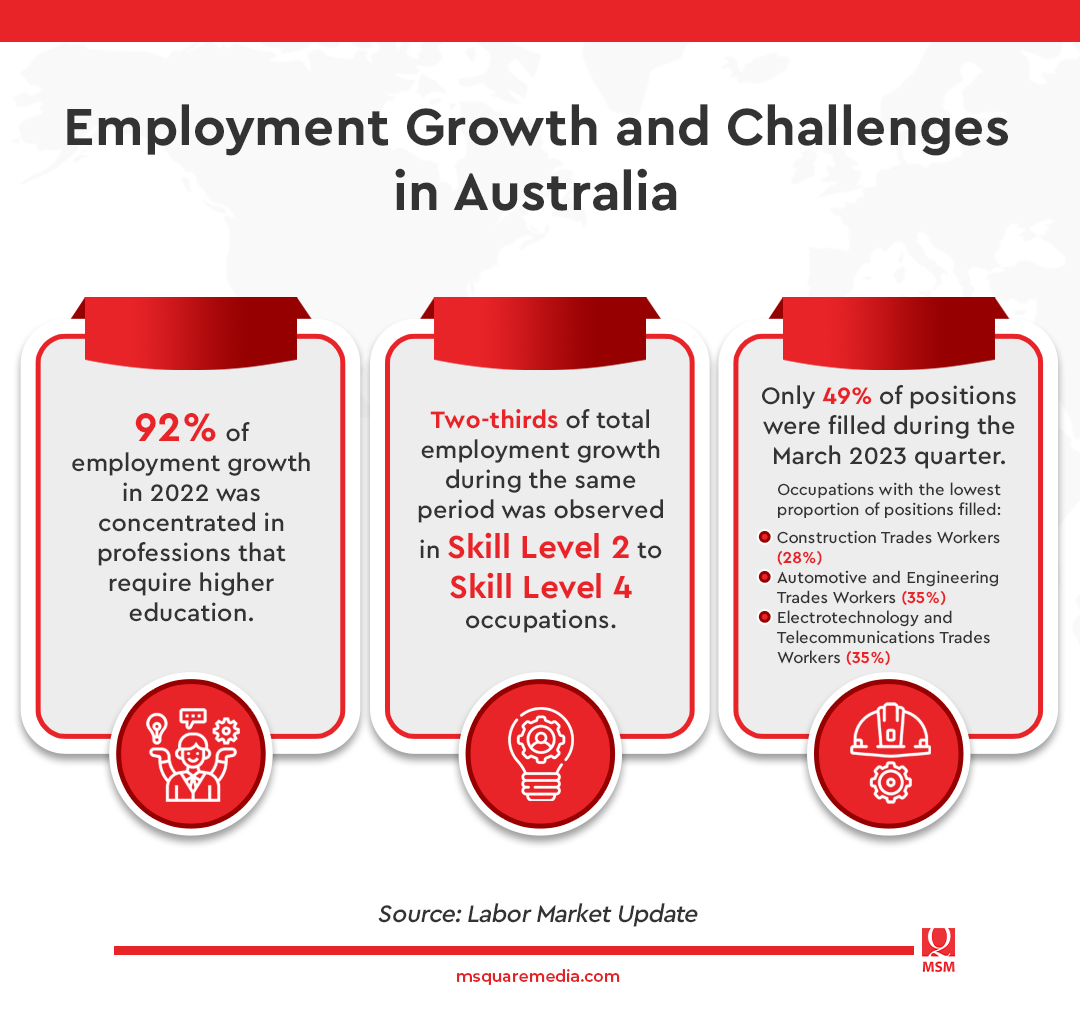Key Takeaways:
- More than 90% of employment growth in 2022 occurred in occupations requiring postsecondary education.
- Construction Trades Workers had the lowest proportion of positions occupied at 28%, followed by Automotive and Engineering Trades Workers at 35% and Electrotechnology and Telecommunications Trades Workers at 35%.
- The Temporary Graduate Work Visa (subclass 485) permits international graduates to work in Australia after graduation.
It is evident that higher education institutions and international students play a crucial role in bolstering Australia’s workforce and economy. These institutions serve as invaluable centers for skill development, equipping students like myself with the knowledge and skills required to meet the ever-changing demands of the labor market. Higher education institutions contribute to the development of a highly competent and adaptable workforce that stimulates economic growth by fostering innovation, critical thinking, and practical application.
In addition, higher education institutions are responsive to industry requirements, ensuring a resilient workforce. These institutions bridge the divide between academia and industry through partnerships, internships, and work-integrated learning programs, equipping students with the skills and experience necessary to excel in the workforce. This industry’s adaptability is essential for sustaining a robust and dynamic economy.
In fact, a recent report has highlighted the vital role that Australian universities play in educating the country’s competent workforce.
Australian universities as breeding ground for employment growth

The recent Labour Market Update published by Jobs and Skills Australia has highlighted the crucial role that Australian universities play in molding the skilled workforce of the nation. More than 90 percent of employment growth in 2022 was concentrated in professions requiring postsecondary education, according to the report. This highlights the critical significance of higher education in addressing the changing demands of the labor market. In addition, two-thirds of the total employment growth during the same period occurred in occupations requiring Skill Levels 2 to 4, indicating the need for specialized skills and knowledge.
Catriona Jackson, the chief executive officer of Universities Australia, emphasizes the importance of university graduates in strengthening the economy as a whole. Numerous industries, such as engineering, healthcare, law, education, and information technology, rely significantly on the expertise and knowledge that universities impart. Jackson underlines the urgency for universities to educate a greater number of individuals with the required qualifications and skills, given the impending demand for skilled labor. More than half of the anticipated one million future positions in Australia will require a bachelor’s degree, according to projections. Universities can advance economic growth, promote prosperity, and provide a solid foundation for national development by equipping the workforce with the necessary knowledge and skills.
The report’s findings underscore the importance of universities in bridging the skills divide in the Australian labor market. As industries continue to evolve and become more specialized, the demand for individuals with advanced credentials increases. Universities in Australia are uniquely positioned to meet this demand because they offer comprehensive and specialized education in numerous disciplines. Universities contribute to the immediate requirements of industries and the nation’s long-term economic growth and prosperity by producing a skilled workforce. The partnership between universities, industries, and policymakers is essential for ensuring that the education system is aligned with the changing requirements of the labor market, thereby facilitating graduates’ transition into the workforce.
Enhancing Opportunities: Extending Post-Study Work Visas for International Students
The report additionally addressed the difficulties encountered by employers in filling vacancies within particular occupations. During the March 2023 quarter, only 49% of technician and trades worker positions were filled, according to the report. This indicates a persistent lack of skilled labor in vital sectors such as construction trades workers (28%) and automotive and engineering trades workers (35%), as well as electrotechnology and telecommunications trades workers (35%). These shortages present substantial obstacles to sustaining productivity and ensuring a thriving workforce in these industries.
The Australian government has implemented measures aimed at international students in order to address skill shortages and provide new opportunities. An example of such an initiative is the extension of post-study work visas. Under the Temporary Graduate Work Visa (subclass 485), international students who conclude their studies at an Australian university can now receive an additional two years of work visa validity. This extension enables them to remain in Australia after graduation and contribute to the workforce.
Beginning in July 2023, students enrolled in courses designed to address labor shortages will be permitted to extend their stay in Australia by four years. This extended time frame affords international students ample opportunity to acquire valuable work experience and contribute to filling skill gaps in high-demand industries. In addition, master’s and doctoral students can now extend their tenure for an additional five and six years, respectively, as opposed to three and four years previously. These measures aim to attract and retain talented individuals who can contribute their skills to sectors experiencing skill shortages, thereby ensuring a more sustainable and vigorous Australian workforce.
By extending post-study work visas, Australian authorities are not only increasing career opportunities for international students but also utilizing their skills and knowledge to meet labor market demands. This initiative simultaneously supports the growth and development of the Australian economy while promoting diversity, cultural exchange, and international collaboration. It represents a strategic approach to maximizing the potential of international students and their contribution to filling critical skill shortages in high-demand industries.
Moving Forward
Universities in Australia play an essential part in educating the skilled personnel necessary for the nation’s prosperity. The recent report has highlighted the need for universities, policymakers, and businesses to collaborate in order to meet the challenges of filling vacancies and addressing skills shortages. Australia can utilize the maximum potential of its universities and international student population by expanding educational opportunities, extending post-study work visas, and promoting equitable earnings. This will result in a strong labor force, sustained economic expansion, and a prosperous future for the nation. (SUNEETHA QURESHI)

SUNEETHA QURESHI
MSM President
Suneetha has worked for 15 years in the international education sector and 25 years overall for her work for other industries. As president of MSM, she fortifies its business development outreach globally, particularly in the face of MSM’s foray into edtech-based recruitment via MSM Unify. She preserves the premium, value-adding services provided to each MSM partner institute, including dedicated teams on the ground, agent management, lead generation and inquiry management, application prescreening, and student and parent support through pioneering pre-departure briefing sessions.
She has an impeccable track record of successfully launching the representative offices in Asia and Africa of many North American and European higher education institutions. Her key strengths include hiring, training, and developing teams as evidenced by the successful results of the dedicated in-country college and university client teams.
Suneetha also has taken the lead in developing several initiatives at MSM, including building robust standard operating procedures, the Rise ‘n Shine team engagement platform, and the organization’s data analytics and audit segments.
Sources:
- 2023. Report: Professions Requiring Higher-Ed Degrees Drive 92% of Employment Growth in Australia. Erudera. Retrieved from https://erudera.com/news/report-professions-requiring-higher-ed-degrees-drive-92-of-employment-growth-in-australia/

